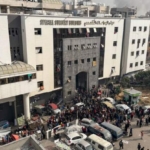The Biden administration is concerned that Hamas’ deadly rocket attack over the weekend has led Israel to fast-track its timeline for a military operation in Rafah, according to a senior administration official and a U.S. official.
Violence in the southern Gaza city spiked on Sunday after Hamas militants fired rockets from near the Rafah crossing, killing four Israeli soldiers. Israeli fighter jets struck targets in Rafah overnight, including a humanitarian aid location the Israel Defense Forces said on Sunday was used as a staging ground for the rocket attack.
Then on Monday, the IDF ordered civilians in a limited section of the city to evacuate to a “humanitarian area” in al-Mawasi, an area along the Mediterranean.
The moves, combined with snags in cease-fire negotiations over the weekend, reflect that Israel may be accelerating its plans to invade Rafah, U.S. officials said, though they stressed that the operation is limited in scope for now and doesn’t necessarily represent the initial phase of an all-out invasion.
“The rocket attack confirms their fear, you still have this pocket there that gone unchecked or left alone will continue to foment violence or pose a threat,” said the U.S. official, who like others was granted anonymity to detail sensitive internal thinking. The attack combined “with the lack of progress in the hostage negotiations, they are inclined to begin pressing.”
The U.S. was unaware that Israel would issue an evacuation order for 100,000 people in Rafah on Monday, a second senior administration official said, sending top U.S. aides scrambling to understand the reasoning. President Joe Biden spoke with Prime Minister Benjamin Netanyahu on Monday in a quickly scheduled call, National Security Council spokesperson Adrienne Watson confirmed, a sign the White House moved swiftly to get a grasp of the situation.
The events present a precarious moment for Biden, who has repeatedly urged Israel to refrain from a full-scale invasion of Rafah without a comprehensive civilian protection plan in place. He faces the possibility of having to more openly defy Netanyahu, which would involve insisting he pull back from sending thousands of Israeli soldiers into a treacherous war zone where about 3,000 Hamas fighters hide in a sprawling tunnel network.
IDF spokesperson Maj. Nir Dinar said the orders his fellow troops received are for evacuating “a certain part of Rafah” and “to keep civilians out of harm’s way.”
“We are preparing and working to dismantle Hamas wherever he is attacking Israel from,” he said.
Defense Secretary Lloyd Austin spoke with his Israeli counterpart, Minister of Defense Yoav Gallant, on Sunday after Hamas fired 10 projectiles from the area adjacent to the Rafah crossing, toward the Kerem Shalom humanitarian crossing, according to an Israeli readout of the call. During the conversation, Gallant told Austin that “military action is required, including in the area of Rafah, at the lack of an alternative,” according to the readout.
The events come as the U.S. still aims to broker a hostage deal and cease-fire between Israel and Hamas, with administration officials noting repeatedly that the militants keep rejecting generous proposals.
“We continue to believe that a hostage deal is the best way to preserve the lives of the hostages, and avoid an invasion of Rafah, where more than a million people are sheltering. Those talks are ongoing now,” NSC spokesperson Watson said.
Netanyahu delivered a fiery address Sunday marking Israel’s Holocaust memorial day, vowing that his nation would move forward with plans to militarily defeat Hamas with or without international support: “If Israel is forced to stand alone, Israel will stand alone.”
“I say to the leaders of the world: No amount of pressure, no decision by any international forum will stop Israel from defending itself,” he continued in English, not Hebrew. “Never again is now.”
The second senior administration official said Washington was still in discussions with Israel about how to ensure humanitarian organizations can safely distribute medical and food aid before the Israel Defense Forces issued the notices.
The evacuation order by the IDF has already caused confusion on the ground where tens of thousands of people, panicked by the sudden notice, are trying to figure out how and when to move to al-Mawasi. It is not clear whether there is enough space in the safe zone for all 1.5 million people who are in Rafah.
Aid workers on the ground told POLITICO that the IDF sent evacuation text messages to humanitarian organizations and to Gazans living in Rafah. They also dropped leaflets explaining the evacuation. From those notices, one of which POLITICO obtained, it appears the IDF plans to begin evacuating people from certain blocks in Rafah.
“The IDF is about to operate with great force against the terror organizations that are present in the area that you are in,” one of the notices said. “For your own safety, you are requested to immediately evacuate the area to the enlarged humanitarian zone in al-Mawasi.”
Some aid workers said people outside the evacuation area are also receiving phone calls from the service telling them to leave their homes, causing confusion.
According to aid workers on the ground, the Rafah crossing is closed as of Monday morning and local “gangs” are looting aid at the crossing and other distribution sites. That’s creating concerns among groups that the evacuation will cause further instability and prevent them from getting aid to those who need it most.
“This is as bad as it gets and will lead to horrifying levels of suffering and death,” said Kiryn Lanning, country director for Palestinian territories at the International Rescue Committee. “If not stopped, this offensive will result in catastrophic humanitarian consequences.”


